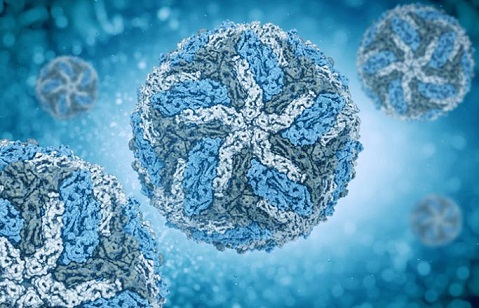Nikhil Prasad Fact checked by:Thailand Medical News Team Aug 16, 2024 1 year, 5 months, 2 weeks, 6 days, 19 hours, 41 minutes ago
Dengue News: Uncovering a New Weapon Against Dengue
Researchers from Stanford University School of Medicine and Harvard Medical School have made a groundbreaking discovery that could revolutionize the fight against dengue fever, a mosquito-borne virus that affects millions worldwide. This
Dengue News report delves into the exciting new research that has identified powerful small molecules capable of degrading a crucial protein in the dengue virus, potentially leading to a new class of antiviral drugs.
 Harvard and Stanford researchers discover new antivirals against Dengue
The Global Threat of Dengue
Harvard and Stanford researchers discover new antivirals against Dengue
The Global Threat of Dengue
Dengue fever, a viral disease transmitted by mosquitoes, poses a significant threat in tropical and subtropical regions. With around 3.6 billion people at risk globally, the virus infects approximately 390 million people annually, leading to severe illness in about 96 million cases. Despite the gravity of this public health issue, no effective antiviral treatments have been approved, and existing vaccines like Dengvaxia have shown limitations, especially in individuals without prior exposure to the virus.
Targeting the Virus with Precision
The research team focused on the envelope (E) protein of the dengue virus, a key component in the virus’s ability to infect host cells. The E protein is essential for the virus to attach to and enter host cells, making it a prime target for antiviral strategies. However, targeting viral proteins for degradation within infected cells has been a challenging task.
A New Approach: PROTACs
The breakthrough in this study involves the use of Proteolysis Targeting Chimeras (PROTACs), a novel class of molecules that can tag specific proteins for degradation by the cell’s proteasome. In this case, the researchers developed two potent PROTACs - ZXH-2-107 and ZXH-8-004 - that specifically target the dengue virus’s E protein for degradation.
The study explored how the PROTACs work. ZXH-2-107 is based on a previously identified molecule, GNF-2, which inhibits a cellular protein known as ABL kinase. However, ZXH-8-004, developed from another molecule called CVM-2-12-2, focuses solely on degrading the E protein without affecting ABL kinase. This specificity is crucial, as it minimizes potential side effects and enhances the antiviral activity.
Testing the Potency of the Degraders
The researchers conducted extensive tests on these molecules in cell cultures infected with the dengue virus. They found that ZXH-8-004 was particularly effective, significantly reducing the levels of the E protein in infected cells at relatively low concentrations. Interestingly, while both ZXH-2-107 and ZXH-8-004 were effective, ZXH-8-004 showed higher specificity and potency in degrading the E protein, making it a more promising candidate for further development.
To confirm the specificity of these degraders, the team used a series of tests to ensure that the molecules were indee
d targeting the E protein and not other cellular proteins. This was crucial to validate that the observed antiviral effects were due to the degradation of the E protein, not off-target effects on other proteins like ABL kinase.
Broader Implications for Antiviral Drug Development
One of the most exciting aspects of this discovery is its potential applicability beyond dengue. The study’s findings suggest that other viral proteins could also be targeted for degradation using similar strategies. This could open the door to a new class of antiviral drugs that are more effective and have fewer side effects than current treatments, which often rely on inhibiting viral enzymes like proteases and polymerases.
The Road Ahead: Challenges and Potential
While the results of this study are promising, several challenges remain before these degraders can be developed into effective antiviral drugs. For instance, the researchers note that the localization of viral proteins within specialized compartments in the cell might protect them from degradation. Additionally, the high abundance of viral proteins like the E protein might make them difficult targets.
Despite these challenges, the success of ZXH-8-004 in degrading the E protein and inhibiting the virus in cell cultures is a significant step forward. Future research will focus on understanding how these degraders interact with the host cell’s machinery and refining their design to enhance their potency and specificity.
Conclusion
This groundbreaking research provides a new direction in the fight against dengue and potentially other viral diseases. By harnessing the power of targeted protein degradation, scientists have developed a novel approach that could lead to more effective antiviral treatments. The discovery of ZXH-8-004, in particular, offers hope for the development of new drugs that can target the dengue virus with unprecedented precision.
The study findings were published in the peer-reviewed journal: Advanced Science.
https://onlinelibrary.wiley.com/doi/10.1002/advs.202405829
For the latest
Dengue News, keep on logging to Thailand Medical News.
Read Also:
https://www.thailandmedical.news/news/thailand-medical-researchers-find-that-extracts-of-clinacanthus-nutans-lindau-can-inhibit-dengue-virus
https://www.thailandmedical.news/news/singapore-study-provides-new-insights-on-how-prior-dengue-infection-influences-covid-19-risk-and-severity
